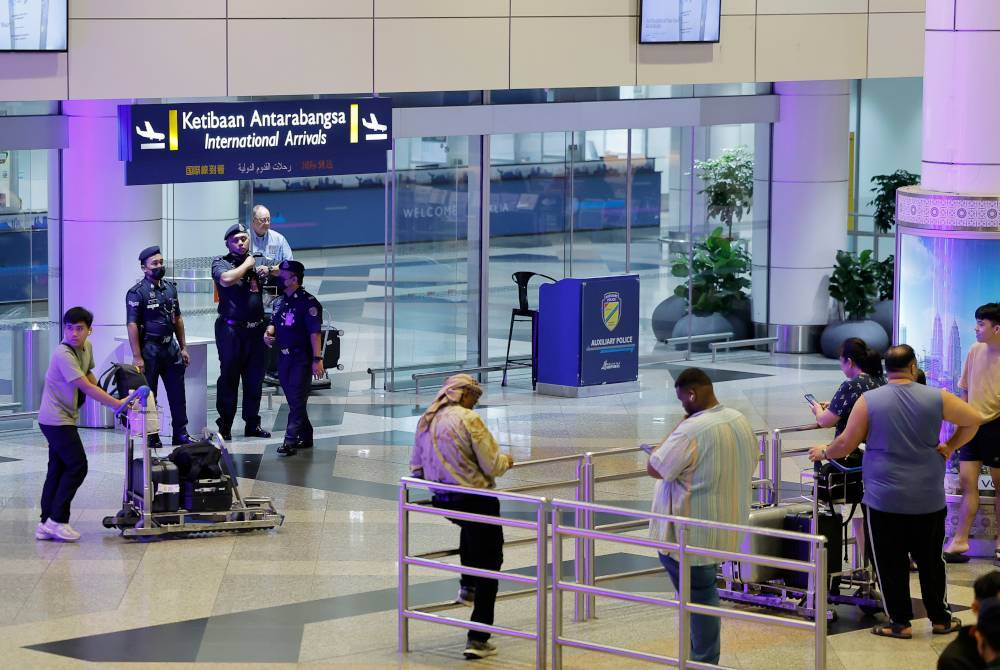KLIA shooting: How secure are our airports?
The shooting incident at the country’s main airport has reignited concerns over the safety of passengers and airport personnel.

SHAH ALAM - The recent shooting incident at Kuala Lumpur International Airport (KLIA) on Sunday has sent shockwaves through Malaysia, raising serious questions about security measures at the nation's airports.
The incident, which occurred in the early hours of the morning at the country’s main airport has reignited concerns over the safety of passengers and airport personnel alike as well as implication among international travellers and aviation stakeholders.
Despite the recent case being a personal vendetta between a husband and wife, it sparked discussions on the possible lack of security which allowed the suspect to bring a gun into the building and how he had the time to escape unscathed.
Criminologist Panier Ramasamy when contacted said there were huge differences between security measures in Malaysian airports and those abroad.
"I am a frequent traveller, what I noticed is that in Malaysia there is less visibility of security personnel in the airports.
“For example, in India, you must have a ticket to enter the airport, departure and arrival hall. Only passengers with valid tickets can enter the building.
"Also there will be visible policemen with dogs walking around the airports all the time and I don't see that environment in Malaysian airports.
"Here, everybody can go in and go out and this has been an advantage for the perpetrator to plan and attack," he told Sinar Daily.
Panier pointed out the lack of such security measures in Malaysian airports created potential loopholes for perpetrators.
"The lack of security visibility poses a significant risk.
"Without stringent measures in place, perpetrators have the opportunity to gather intelligence and carry out attacks with relative ease," he said.
Panier further stressed the importance of heightened security visibility, stating that the absence of such measures could provide an advantage to potential attackers.
"The airport will always be targeted in the case of terrorism, similar to 9/11 World Trade Centre incident where the terrorist used the airport to hijack a plane. They (terrorist) will always target crowded places," he said.
To curb any unfortunate incidents, Panier called for collaboration between airport security and law enforcement agencies to bolster security measures and ensure constant vigilance.
Meanwhile, criminologist Kamal Affandi Hashim also stressed the priority of ensuring public safety in such risky situations, acknowledging the challenges of managing security at a busy airport like KLIA.
"Implementing metal detectors might seem noble in theory, but in practice, it would lead to extensive delays and logistical challenges, potentially compromising airport operations," he said when responding to comments urging for metal detectors in the airport's entrance.
He urged critics to consider the broader implications of security measures, emphasising the need for a balanced approach that prioritises public safety while minimising disruptions to travel.
"While it's tragic that someone was hurt in this incident, managing security at a major airport with limited resources and budget is a daunting task.
"We must find a solution that effectively addresses security concerns without unduly burdening passengers and airport operations," he said.
On the recent shooting case, Kamal highlighted the potential security breach that allowed the perpetrator to target his intended victim with precision.
"I am more concerned about our ability to handle the case without realising the crucial element, that is the intended subject.
"In this case, the accusation was done with prior planning, having information about the target's whereabouts with the exact time and date. The breach of information is concerning, indicating the shooter's ability to gather intelligence and plan accordingly," he said.
Kamal also dismissed speculations of terrorism, adding that such acts are typically carried out for propaganda purposes and do not discriminate among victims.
However, he warned that if the situation escalated to a hostage scenario, it could potentially evolve into an act of terror.
On April 14 at 1.20am, a man identified as Hafizul Harawi, 38, fired two shots at his wife at the entrance of the arrival hall but missed, and one shot hit her bodyguard in the abdomen instead.
The suspect then fled the scene with a getaway car.
After more than 24 hours on the run, the suspect was apprehended by the police in Kota Bharu, Kelantan at 3pm yesterday.
The bodyguard was admitted to hospital and is reported to be in stable condition.
Following the incident, Bukit Aman Criminal Investigation Department (CID) director Commissioner Datuk Seri Mohd Shuhaily Mohd Zain said the security measures at the KLIA 1 will be reviewed.
"This is not the first time an untoward incident has occurred at an airport here. That said, security measures will be studied thoroughly and comprehensively," Shuhaily had said.
Meanwhile, Selangor police chief Datuk Hussein Omar Khan said that several improvement measures would be taken to raise the level of airport security and the efficiency of police personnel including the use of electric scooters to ensure faster police response and wider patrols
He had also said that police refrained from ‘engaging’ the suspect in Sunday’s shooting incident to avoid jeopardising public safety as the area where the suspect opened fire was crowded and engaging him could have led to a more serious incident.
"It was better to let the suspect leave the area and keep members of the public safe. If we engaged him, there would have been a shootout. There were children among the many people there,” he said when asked why police did not apprehend the suspect.











